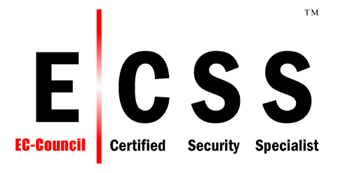Course Overview
The EC-Council Certified Security Specialist (ECSS) course is a comprehensive training program designed to provide learners with a foundation in various aspects of information security. This course includes essential topics ranging from information security fundamentals, networking, and secure network protocols, to more advanced subjects such as ethical hacking, incident response, and computer forensics. By engaging with the course modules, participants will learn how to identify and defend against security threats, understand the principles of cryptography, configure firewalls, and leverage intrusion detection systems. Additionally, they’ll explore the intricacies of VPNs, wireless network security, web security, and the legal aspects of digital evidence. The ECSS certification is an asset for anyone looking to establish or advance their career in IT security. It equips learners with practical skills and knowledge, preparing them to handle real-world security challenges effectively. This certification is recognized globally and is a testament to the holder’s expertise in security and forensics, making it a valuable credential for IT professionals.
Target Audiance
- Anyone Who Want To Enhance Their Skills And Make Career In Network Defense, Ethical Hacking, and Digital Forensics Fields.
Schedule Dates
ECSS: EC Council Certified Security Specialist
ECSS: EC Council Certified Security Specialist
ECSS: EC Council Certified Security Specialist
ECSS: EC Council Certified Security Specialist
Course Content
- Network Security Fundamentals
- Identification, Authentication, and Authorization
- Network Security Controls: Administrative Controls
- Network Security Controls: Physical Controls
- Network Security Controls: Technical Controls
- Virtualization and Cloud Computing
- Wireless Network Security
- Mobile Device Security
- IoT Device Security
- Cryptography and the Public Key Infrastructure
- Data Security
- Network Traffic Monitoring
- Information Security Fundamentals
- Ethical Hacking Fundamentals
- Information Security Threats and Vulnerability Assessment
- Password Cracking Techniques and Countermeasures
- Social Engineering Techniques and Countermeasures
- Network Level Attacks and Countermeasures
- Web Application Attacks and Countermeasures
- Wireless Attacks and Countermeasures
- Mobile Attacks and Countermeasures
- IOT & OT Attacks and Countermeasures
- Cloud Computing Threats and Countermeasures
- Penetration Testing Fundamentals
- Computer Forensics Fundamentals
- Computer Forensics Investigation Process
- Understanding Hard Disks and File Systems
- Data Acquisition and Duplication
- Defeating Anti-forensics Techniques
- Windows Forensics
- Linux and Mac Forensics
- Network Forensics
- Investigating Web Attacks
- Dark Web Forensics
- Investigating Email Crimes
- Malware Forensics
FAQs
The Certified Security Specialist (CSS) certification is a professional designation that validates an individual’s expertise in various aspects of cybersecurity. It signifies that the holder has demonstrated proficiency in designing, implementing, and managing security solutions to protect organizations from cyber threats effectively.
The prerequisites for obtaining the CSS certification may vary depending on the certifying body or organization offering the certification. However, typical prerequisites may include a certain level of experience in the cybersecurity field, completion of specific training courses, and passing an exam covering relevant cybersecurity topics.
The Certified Security Specialist (CSS) certification exam typically covers a wide range of topics related to cybersecurity, including but not limited to network security, cloud security, endpoint security, cryptography, risk management, compliance, incident response, and security operations. The exam is designed to assess the candidate’s knowledge and skills in these areas to ensure they are well-equipped to handle cybersecurity challenges effectively.
Earning the Certified Security Specialist (CSS) certification can significantly benefit your career in cybersecurity by validating your expertise and proficiency in various security domains. It enhances your credibility and demonstrates to employers and peers that you possess the necessary skills and knowledge to protect organizations from cyber threats effectively. Additionally, holding the CSS certification may open up new career opportunities, increase your earning potential, and provide a competitive edge in the rapidly evolving field of cybersecurity.

 4.8
4.8





